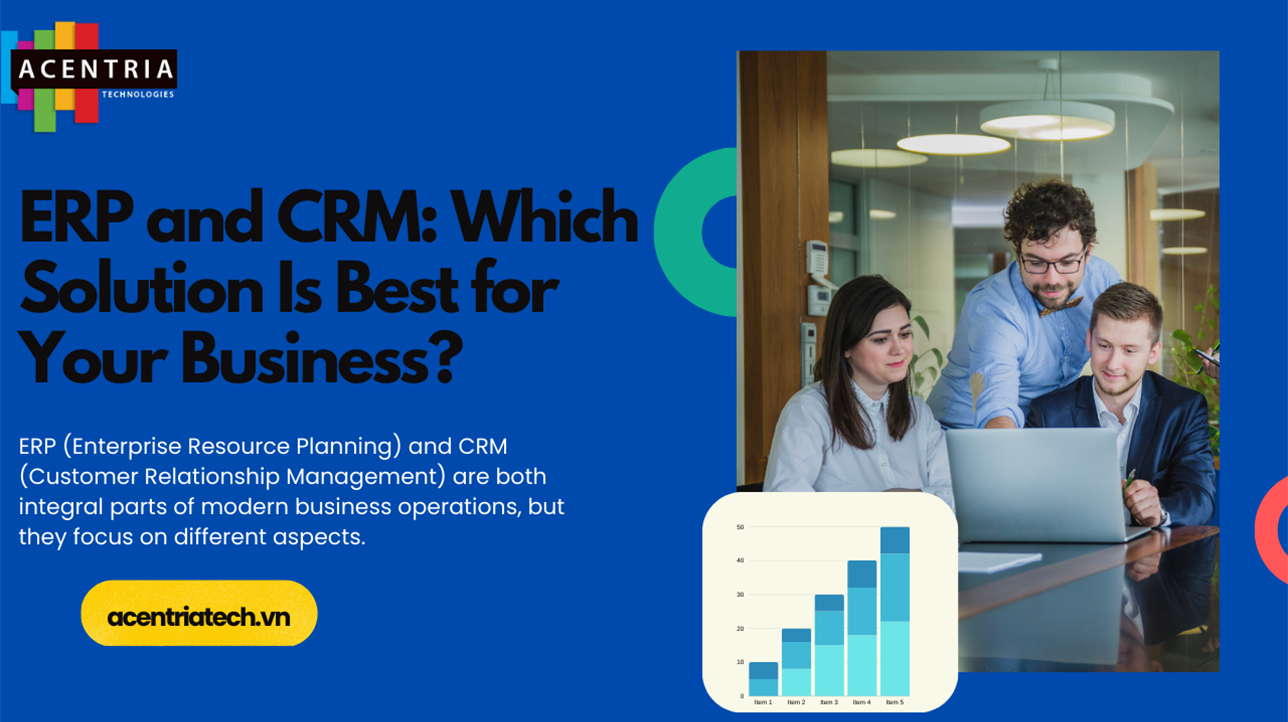ERP and CRM systems: Which Solution Is Best for Your Business?
In today’s fast-paced digital world, businesses are constantly looking for ways to streamline operations, improve customer relations, and make data-driven decisions. Two powerful software solutions that have emerged to meet these needs are Enterprise Resource Planning (ERP) systems and Customer Relationship Management (CRM) systems. While both serve crucial functions in enhancing business efficiency, understanding their differences and applications is key to determining which solution is best for your company.
In this blog, we’ll explore the distinctions between ERP and CRM systems, their functionalities, and how businesses can decide which one— or even both— is the right choice for their needs.
Understanding ERP and CRM Systems
ERP (Enterprise Resource Planning) and CRM (Customer Relationship Management) are both integral parts of modern business operations, but they focus on different aspects.
ERP (Enterprise Resource Planning)
ERP software integrates core business processes into a unified system. It helps organizations manage essential functions like accounting, inventory, procurement, human resources, manufacturing, and supply chain management. By centralizing data, an ERP system provides real-time information across departments, helping businesses streamline operations, reduce redundancy, and improve decision-making.
Popular ERP solutions include platforms like SAP, Oracle, and Microsoft Dynamics, but there are also industry-specific ERP solutions and customizable options. For example, a Shopify ERP solution might be tailored for e-commerce businesses, while Magento ERP solutions cater to online stores built on the Magento platform.
Key Benefits of ERP:
Centralized data management: All business functions are linked in one system, providing accurate, real-time data.
Improved efficiency: Automation of routine tasks reduces manual work and errors.
Better decision-making: Access to integrated data allows for more informed decisions.
Scalability: ERP systems grow with your business, adding modules as needed.
CRM (Customer Relationship Management)
On the other hand, a CRM system focuses on managing and improving customer interactions. It stores customer data, tracks communications, manages sales leads, and helps businesses build stronger relationships with their clients. CRM solutions are crucial for improving customer service, increasing sales, and boosting overall customer satisfaction.
CRM platforms like Salesforce, HubSpot, and Zoho CRM are widely used to enhance customer engagement and optimize sales pipelines. Some businesses even opt for custom ERP solutions that include integrated CRM functionality, allowing them to manage both customer relations and enterprise operations from a single platform.
Key Benefits of CRM:
Enhanced customer relationships: Track customer interactions, anticipate needs, and personalize service.
Sales optimization: Organize leads, track progress, and automate follow-ups to improve conversion rates.
Customer insights: Gain actionable insights through data analytics, which can inform marketing and sales strategies.
Collaboration: Sales, marketing, and customer service teams can collaborate effectively using shared data.
ERP vs. CRM: Key Differences
While ERP and CRM systems serve different purposes, many businesses often wonder which one is more important for their needs. To help you make a decision, here are the key differences between ERP and CRM systems.
Scope of Functionality
ERP: Covers a broad range of back-office operations, such as finance, HR, supply chain, and inventory management.
CRM: Focuses on front-office operations, particularly customer interaction, sales, marketing, and customer service.
Primary Users
ERP: Typically used by employees in accounting, procurement, HR, logistics, and operations teams. It helps businesses manage internal processes and resources.
CRM: Primarily used by sales, marketing, and customer support teams to improve customer relationships and manage the customer lifecycle.
Integration and Customization
ERP: Often requires significant customization to match specific business needs, especially in large-scale organizations. Many businesses opt for custom ERP solutions to ensure they get a system that fits their exact requirements.
CRM: Although customizable, CRM systems are generally more focused on customer data and interaction. Some ERPs come with integrated CRM features to provide an all-in-one solution.
Data Focus
ERP: Deals with operational data related to the business processes, such as inventory levels, employee data, financial records, and supply chain logistics.
CRM: Focuses on customer data, including contact information, purchase history, communication logs, and customer preferences.
ERP and CRM: Complementary or Competing?
While both systems serve distinct roles, many businesses find that an integrated approach, using both ERP and CRM software, is the most effective way to drive growth and efficiency. Here’s why:
Integrated Solutions for Holistic Management: Some enterprise resource management systems (ERMs) offer both ERP and CRM functionalities within a single platform. This integration allows data to flow seamlessly between departments, ensuring that sales, marketing, and customer service teams have real-time access to operational data, and vice versa. For example, sales teams can access inventory data to inform customers about product availability, while the finance team can get insights into sales performance.
Customer-Centric Operations: With an integrated ERP and CRM solution, businesses can align their operations with customer needs. Real-time order processing from the ERP system, combined with customer insights from the CRM, allows businesses to deliver better service and meet customer demands faster.
Optimized Resource Allocation: By integrating both systems, businesses can better allocate resources based on customer demand patterns and operational capacity. For instance, an e-commerce company using a Shopify ERP solution integrated with a CRM system can forecast demand, manage inventory, and fulfill orders with more precision and sports news.
Read more: https://candypulse.org/category/sports/
Choosing the Right Solution for Your Business
When it comes to choosing between ERP and CRM, consider the following factors to help determine the best fit:
Business Size and Complexity: Larger organizations or those with more complex operations are likely to benefit from an ERP system, as it helps integrate various functions across the company. Smaller businesses focused on sales and customer relationships might find CRM solutions more beneficial in the short term.
Business Goals: If your primary goal is to streamline internal processes, such as accounting, inventory, and production, ERP software development services are your best bet. If improving customer relationships, enhancing sales, and optimizing marketing efforts are top priorities, CRM solutions should be your focus.
Industry Requirements: Certain industries require highly specialized features, such as manufacturing or retail. Magento ERP solutions for retail businesses or Shopify ERP solutions for e-commerce companies may be more suitable, as they offer industry-specific functionalities. Similarly, businesses in customer-centric industries should prioritize CRM systems.
Customization Needs: If your business has unique requirements, opting for custom ERP solutions or a custom CRM solution may be necessary. Customization allows you to tailor the system to your specific processes, ensuring maximum value.
sitemap: https://candypulse.org/sitemap_index.xml
Conclusion
Ultimately, the decision between ERP and CRM comes down to what your business needs most. ERP solutions are invaluable for managing operations, streamlining workflows, and improving data visibility across departments. On the other hand, CRM systems are essential for fostering better customer relationships and driving sales. In many cases, businesses benefit from using both systems in tandem—whether through an integrated enterprise resource planning system or separate solutions.
If you’re unsure whether to implement one or both, consider reaching out to ERP software development services or CRM experts to help guide your decision-making process and ensure that you select the solution that will best support your business goals.
By understanding the strengths and roles of ERP and CRM systems, your business can make a more informed decision about which technology to adopt for long-term success.




